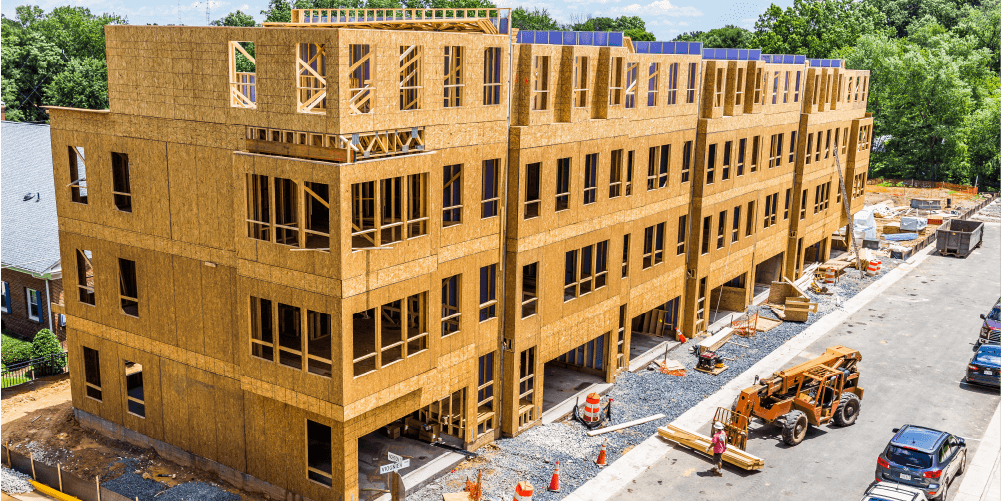— 8 min read
The Ultimate Guide to Residential Construction Management

Last Updated Aug 15, 2025

Julia Tell
Contributing Writer
71 articles
Julia Tell is a freelance writer covering education, construction, healthcare, and digital transformation. She holds a Ph.D. in Media & Communications and has written for publications including Business Insider, GoodRx, and EdSurge, as well as nonprofits, international businesses, and educational institutions.

Ben Ashburn
Staff Trainer & Program Manager
22 articles
Ben Ashburn is a Senior Construction Education Trainer at Procore. After a successful career as a construction estimator — working his way up from estimating manager to senior estimator — Ben has spent the most recent part of his career in construction sharing his skills with other as a construction educator. Ben has an extensive background in construction education: He has been an assistant professor in the Department of Construction Science at Texas A&M, and lectured about estimating, scheduling, management, and other related construction topics at Murray State University. He has been a construction training and learning development partner with Procore since 2019.
Last Updated Aug 15, 2025

The US construction industry is constantly working to keep up with demand for housing. Improving residential construction management can increase efficiency and productivity for companies looking to help meet demand — and stakeholder expectations for projects.
Residential projects have unique elements that set them apart from commercial construction projects. This article will examine the role of the residential construction project manager, including challenges and best practices for success, plus the growing importance of technology in streamlining the residential construction process.
Table of contents
What is residential construction management?
Residential construction management is a specialized area of project management focused on planning, coordination and execution of construction projects for residential properties. Projects can range from custom homes and single-family residences to multi-family developments like apartment complexes and condominiums. Many residential contractors perform renovations or upgrades as part of their portfolio.
Unlike commercial construction projects, which often involve larger scopes and more complex logistical demands, residential projects frequently cater to individual homeowners or small groups of stakeholders. The primary distinctions between residential and commercial construction are the level of client involvement and different regulatory requirements.
Residential projects often require a more personalized approach, with developers or homeowners participating in decision-making to tailor spaces to specific lifestyle needs. Residential construction managers must understand local zoning laws and building codes for residences rather than commercial spaces to ensure compliance and avoid costly delays.
The Role of the Construction Manager in Residential Projects
A residential construction manager (often synonymous with a project manager for residential developments), is responsible for making daily decisions that affect the project's trajectory. The role encompasses a variety of tasks, including budgeting, scheduling, permitting, resource allocation, liasing with mutliple stakeholders for compliance and confirming compliance with local regulations.
Although the terms "construction manager" and "project manager" are often used interchangeably, they are distinct roles in larger projects and companies:
Project managers oversee the complete lifecycle of a project, from preconstruction to post-construction handover to the owner.
A construction manager is primarily responsible for the construction phase, including tasks like overseeing subcontractors, managing resources and addressing challenges on site.
While the residential construction project manager often helps select subcontractors and determine the sequence of construction activities, a residential construction site manager or superintendent handles most site logistics and addresses issues that arise on-site.
The team handling residential construction management services oversees every aspect of the construction process and transforms architectural plans into real-world structures that meet regulatory standards and client expectations.
For a residential project that relies on rent to generate revenue, project managers should work with GCs to hire more high-quality skilled laborers. Having more onsite workers devoted to quickly and efficiently getting the project done can reduce financial bleedout for the owner and reduce the risk of rework.

Jonathan Casilli
Senior Strategic Product Consultant
Procore
Skills Required of Residential Construction Managers
Residential construction managers are responsible for the successful completion of housing projects. Below are some qualities and skills that define an effective residential construction manager.
Project Management
Ability to plan, coordinate and oversee all aspects of residential construction projects, from inception to completion
Technical Knowledge
Understanding of construction methods, materials and technologies relevant to residential building
Regulatory Compliance
Familiarity with local zoning laws, building codes and safety regulations so that projects meet legal standards
Communication Skills
Proficiency in communicating effectively with homeowners, subcontractors architects and other regulatory bodies
Problem-Solving Abilities
The capacity to identify potential issues and implement solutions quickly to keep projects on track
Leadership and Team Management
Strong leadership skills to manage diverse teams and foster a collaborative work environment
Time Management
Ability to prioritize tasks and manage time effectively to meet project deadlines
Financial Acumen
Skill in budgeting and cost management to control project expenses and maximize resource efficiency
These qualities and skills enable residential construction managers to navigate the complexities of construction projects and deliver homes that meet both client expectations and regulatory requirements.
The Phases of Residential Construction Project Management
Management of residential construction is a systematic process that unfolds across four primary phases. Milestones in each phase help maintain project timelines, prevent delays and minimize rework. Here’s an overview of the typical phases involved.
1. Planning Phase
During the planning phase, stakeholders define the project scope, set objectives and develop a comprehensive project plan.
Activities include site selection, feasibility studies, budgeting and scheduling. Effective planning establishes clear milestones that guide the project through subsequent phases in alignment with client expectations and regulatory requirements.
2. Preconstruction Phase
In the preconstruction phase, the project moves from planning to preparation. This involves finalizing design details, obtaining necessary permits, selecting contractors and procuring materials.
The creation of detailed blueprints and construction plans helps set clear expectations for all stakeholders. Establishing well-defined milestones in this phase can identify potential issues early — helping prevent costly delays later on during construction.
Build a Strong Foundation with our Preconstruction Course
With 20+ years of experience, Ben Ashburn teaches you how to streamline planning, bidding, and procurement for better outcomes.

3. Construction Phase
The construction phase is where the physical work begins. This phase involves executing the plans developed in the previous stages, coordinating labor and materials and managing on-site activities. Clear milestones, such as completing foundational work, framing and roofing, help keep the project on track.
4. Post-Construction Phase
In the post-construction phase, the focus shifts to finalizing the project and preparing for occupancy. This includes conducting final inspections, addressing any punch-list items and making sure all regulatory compliance requirements are met.
The project closeout involves handing over documentation, such as warranties and manuals, to the client.
Within all of these phases, construction managers perform four primary types of management: cost, time, quality and safety management. The phases and types of management apply to types of construction, including commercial, heavy civil, industrial and institutional.
But residential construction managers have unique challenges in effectively guiding projects to successful completion.
Challenges Specific to Residential Construction
Home builders face many of the same challenges as all construction companies, but often with some unique features that require careful planning and high levels of communication to overcome. Here are some of the most common challenges in residential construction management.
Budget Issues
Material and supply cost fluctuations, unforeseen site conditions and scope creep due to homeowner indecision can especially impact home construction projects.
Scheduling and Delays
Handling many smaller construction projects simultaneously can mean juggling multiple municipalities’ permitting processes, moving subcontractors from site to site and pressure from owners to speed up completion. Supply chain issues and weather delays also cause headaches.
Client Management
Whether the client is a homeowner, a town contracting for affordable housing developments or a developer, maintaining consistent communication during changing client requests can be challenging.
Though production home builders are generally good at setting boundaries for changes, once construction has begun, it’s a different story, especially with custom builders who face more challenges accommodating changes.
And if the homeowner is the client, even more issues can arise. Often, homeowners lack construction experience but want to be heavily involved because it's their home. This involvement can significantly slow down the process, especially when they request changes that are more complex than they appear.
Resource Management
The management and coordination of materials, equipment and labor — espeically during procurement — can be a common challenge for residential managers. Hurdles like market price fluctuations and equipment breakdowns can disrupt procurement timelines, thus delaying projects.
Labor shortages impact all construction, but in residential, finding and scheduling the workers with specialized skills for elements of the build can be difficult. Maintaining a pool of workers capable of maintaining quality while under time pressure also impacts home building.
Safety and Vandalism
Multiple smaller work sites can make maintaining safety more challenging for homebuilders. Single-family and smaller developments may have less site protection in off-hours, so they are more vulnerable to vandalism, theft and safety hazards to the public.
Safety is a significant issue and a major difference between commercial and residential construction. Even with large production home builders, who should prioritize safety, it's often lacking.

Ben Ashburn
Staff Trainer & Program Manager
Procore Technologies
Residential Building Case Study: Streamlining Tasks and Communication with Software
For busy home builders, software can make the difference between inefficient paperwork and a smoothly operating project team. Before adopting a project management platform, Capstone Homes, a Bahamian construction company specializing in luxury residential projects, faced challenges with disorganization and a lack of transparency. Their documents weren't organized and stored across various folders, which made it difficult to maintain accountability and efficiency.
A digital project management platform helped Capstone streamline its operations and improve collaboration. The software provided a single, integrated platform that connected homeowners, architects, designers and other professionals.
This improved accountability and efficiency by documenting all changes and keeping all stakeholders involved throughout the process. This allowed Capstone to save approximately 10% on each project, maintain high-quality standards while growing the business — and even use the software as a key selling point to attract new clients.
Best Practices in Residential Construction Project Management
Implementing best practices in residential construction management can significantly boost project outcomes and profitability. Here are some recommendations to consider:
Standardize documentation.
Create a uniform system for documentation to provide consistency and accuracy across all project phases, simplifying tracking and compliance. Implementing standardized documentation and maintaining open communication from the outset are key in residential construction.
Use digital templates.
Digital construction templates can streamline processes and improve efficiency for project planning and reporting.
Maintain weekly site reviews.
Conduct regular site inspections to monitor progress, identify potential issues early and maintain quality standards.
Communicate early and often.
Establish open lines of communication with all stakeholders from the outset to prevent misunderstandings and align expectations. Investing in the right people and tools is essential for smoother, more efficient builds.
Streamlining the Future of Residential Construction Management
While residential construction companies have traditionally been slower to adopt technology, integrating advanced tools like project management software and digital templates can significantly improve efficiency and oversight.
There's potential to streamline purchasing, improve the accuracy of estimates and budgets, and improve labor tracking with appropriate management software. Unfortunately, many residential builders do not track these elements closely.
Ben Ashburn
Staff Trainer & Program Manager
Procore Technologies
These technologies streamline processes, improve communication and enable real-time residential construction project management, leading to smoother operations and reduced delays. Investing in the right people and tools helps companies meet client expectations, drive project success and increase profitability.
Was this article helpful?
Thank you for your submission.
0%
0%
You voted that this article was . Was this a mistake? If so, change your vote
Scroll less, learn more about construction.
Subscribe to The Blueprint, Procore’s construction newsletter, to get content from industry experts delivered straight to your inbox.
By clicking this button, you agree to our Privacy Notice and Terms of Service.
Thank you!
You’re signed up to receive The Blueprint newsletter from Procore. You can unsubscribe at any time.
Categories:
Written by

Julia Tell
Contributing Writer | Procore Technologies
71 articles
Julia Tell is a freelance writer covering education, construction, healthcare, and digital transformation. She holds a Ph.D. in Media & Communications and has written for publications including Business Insider, GoodRx, and EdSurge, as well as nonprofits, international businesses, and educational institutions.
View profileReviewed by

Ben Ashburn
Staff Trainer & Program Manager | Procore Technologies
22 articles
Ben Ashburn is a Senior Construction Education Trainer at Procore. After a successful career as a construction estimator — working his way up from estimating manager to senior estimator — Ben has spent the most recent part of his career in construction sharing his skills with other as a construction educator. Ben has an extensive background in construction education: He has been an assistant professor in the Department of Construction Science at Texas A&M, and lectured about estimating, scheduling, management, and other related construction topics at Murray State University. He has been a construction training and learning development partner with Procore since 2019.
View profileExplore more helpful resources

6 Types of Construction Projects: Key Differences for Owners & Contractors
Construction projects are often categorized based on their scale, the types of structures being built, and the purpose of the project (also called “end use” or “land use”). Broadly, there...

Preconstruction Precepts: 7 Keys to Winning Jobs and Delivering Profit
Preconstruction sets the stage for everything that follows. A fully justifiable, error-free estimate projects confidence, wins bids, and assures the profitability of the final project. However, estimates and budgets are,...

6 Tips to Turn Construction Culture Into Daily Practice
Every construction company has a culture. Whether it’s intentional or not. The difference lies in how that culture shows up on the job. In the first article of this series on...

Turning Values into Workflows: How a GC Firm Operationalized Culture
Culture isn’t just about what companies believe — it’s about how those beliefs show up in day-to-day work. When culture is embedded into operations, it becomes something teams can rely...
Free Tools
Calculators
Use our calculators to estimate the cost of construction materials for your next project.
Templates
Find a template to help you with your construction project tasks.
Material Price Tracker
Get the latest U.S. retail prices and view historical trends for common building materials.
Glossary
Explore key terms and phrases used in the industry.
